Mar 29: E-Stories
RUattacksKyiv Kharkiv CombatSit BehindLines RUpassports InRussia Allies US A&P Avdeeva RU24 UKDef ISW Davis Lautman Troy Kenyon USDeptState Zelensky Panyi MoutetMonocle TimesRad Rosenberg Andrzejczak
Catching up…
EA Worldview’s Ukraine Up-date- hop over to Scott’s amazing hourly Ukraine up-date page. I’ll fill in with some bits and bobs.
Stories we’re following…
Russia conducted a high-precision airstrike on a residential area in Kharkiv Ukraine. Locals report that apartment buildings and a school were hit. At least 16 people are injured, among them children. Another missile strike targeted Mykolaiv and injured at least 8 people. The explosion occurred on a playground between two high-rise buildings in the Shevchenkivskyi district. The blast wave tore off the facades and balconies of at least two buildings.
In Kharkiv 200,000 residents have gone without electricity since last Friday’s attacks on the country’s energy infrastructure. Emergency power outages have also reportedly been introduced in Ukraine’s Black Sea port city of Odesa.
Destruction in the main building of the Kherson state university after another attack. Russian shelling partially destroyed the outer walls and smashed dozens of windows. Furniture and other property in the classrooms were damaged.
Mar 26: Russian attacks on Kharkiv, Kupiansk injure man, target dormitory. A Russian Kh-35 anti-ship missile hit the dormitory of Kharkiv's sports college in the morning, Serhii Bolvinov, the head of the investigative department of the regional police, said. A 64-year-old man reportedly suffered from shock.
In Kharkiv and parts of the south-eastern Zaporizhzhia region, 200,000 residents have gone without electricity since last Friday’s attacks on the country’s energy infrastructure. Emergency power outages have also reportedly been introduced in Ukraine’s Black Sea port city of Odesa.
Ukrainian Foreign Minister Kuleba doesn't hold back: "Give us the damn Patriots". The appeal comes after yet another series of Russian missile attacks on Ukraine. We’re all screaming the same thing.
"If we had enough air defense systems, namely Patriots, we would be able to protect not only the lives of our people, but also our economy from destruction," he added.
Preliminary reports coming out of occupied Crimea, a Russian Su-34/35 was shot down over Sevastopol. "A military plane crashed into the sea near Sevastopol, the pilot ejected and his life is not in danger," said Russian appointed city governor Mikhail Razvozhaev.
Combat Situation Update
President Zelensky revealed that the Russian Federation is planning an offensive at the end of May or in June in an interview with CBS. He described Russian artillery attacks on settlements as precursors to potential occupation attempts. Zelensky emphasized the need for increased international assistance, as 75% of American aid remains in the United States. Additionally, he warned of potential missile strikes on other states if Ukraine were to face defeat.
Air Force: Ukraine can down Zircon hypersonic missile with Patriot, SAMP/T. Air Force spokesperson Ilia Yevlash's statement came after reports that Russian troops had used Zircon ballistic missiles in a March 25 attack on Kyiv. The researchers continue to examine the debris to determine what type of missile was launched.
Zelensky visits Sumy Oblast, inspects fortifications. President Volodymyr Zelensky was briefed on the project for the construction of a platoon stronghold near Sumy, which includes reinforced concrete structures, firing positions for tanks and infantry fighting vehicles, and corrugated steel shelters.
"Last night, on the Tendra Spit on the occupied left bank of the Kherson region, the Ukrainian armed forces destroyed a large hangar filled with ammunition," speaker of the Odesa regional military administration Serhiy Bratchuk said.
Putin intends to continue the war, but with different goals. Meduza reports that Putin might be focussing on capturing Kharkiv and gradual end the 'special operation' after that. Previously Putin said that a 'sanitary zone' is needed to protect Bilhorod.
"According to updated information, on March 24, in addition to the large amphibious assault ships Yamal and Azov, the Ukrainian Defense Forces successfully engaged the reconnaissance ship Ivan Khurs and the large amphibious assault ship Kostyantyn Olshanskyi," the Ukrainian Navy reports.
Nato is considering shooting down Russian missiles that stray too close to its borders, Poland’s deputy foreign minister, Andrzej Szejna, told Polish media outlet RMF24. Szejna said that “(Russia) knew that if the missile moved further into Poland, it would be shot down. There would be a counterattack.” Poland’s armed forces said that Russia violated Poland’s airspace at 4:23am (0323 GMT) on Sunday morning with a cruise missile launched at targets in western Ukraine.
Partisans: Russia constructing barriers to prevent further strikes on Black Sea fleet. Russian forces in occupied Crimea are constructing barriers at the entrance to Sevastopol Bay to prevent further Ukrainian strikes on the Black Sea fleet, the partisan group Atesh reported on March 27.
Behind the Lines
Nato is considering shooting down Russian missiles that stray too close to its borders, Poland’s deputy foreign minister, Andrzej Szejna, has told Polish media outlet RMF24.
Szejna said that “(Russia) knew that if the missile moved further into Poland, it would be shot down. There would be a counterattack.”
“Various concepts are being analysed within Nato, including for such missiles to be shot down when they are very close to the Nato border,” he added, noting that this would need Ukrainian approval if it were to happen.
The government of Petr Fiala has added two more people and one company to the Czech sanctions list.
The decision is related to the recent BIS revelations that Russians are trying to influence the European Parliament elections in Germany, France, and Belgium. According to the counterintelligence agency, the main actors in the influence network were two Ukrainian businessmen and politicians with close ties to Russia - Viktor Medvedchuk and his close associate Artyom Marchevsky.
In addition to these two, the Czech government also placed Voice of Europe, a Czech company based in Prague that operates a pro-Russian news website, on the sanctions list. The BIS alleges that Moscow influenced and financed the website and its content. In addition, the BIS has documented that the cash money also went to some politicians spreading Russia-friendly narratives—in particular, that an end to the war would be achieved by stopping the supply of weapons to Ukraine. According to the BIS, hundreds of thousands of euros have been paid from Russia for these purposes in the last year alone.
In case of a confrontation with Russia, the British military wouldn't be able to fight longer than 2 months, Deputy Chief of Defence Staff Lieutenant General Sir Rob Magowan said. "Lack of funding puts us at a disadvantage across the field," he warns.
The US and UK are reviewing more than $20 billion of cryptocurrency transactions that passed through a Russia-based virtual exchange, as part of allied efforts to crack down on the sanctions evasion that’s supporting Putin’s war in Ukraine.
French authorities uncovered a website containing a fake recruitment drive for French volunteers to join the war in Ukraine, the defence ministry said on Thursday. The site has now been taken down by French services, a government source, who asked not to be named, told AFP without giving further details on the nature of the operation.
The Globalist with Anne-Elisabeth Moutet: We discuss tensions between Emmanuel Macron and Olaf Scholz, and what they mean for Ukraine. Plus, plans for a significant upgrade to the security alliance between the US and Japan, Boeing’s management reshuffle and technology news.
Meanwhile in Russia
Deputy head of the Federal Customs Service Elena Yagodkina was detained. According to an RBC source, the investigation concerns the calculation of customs duties. General Yagodkina is being checked for involvement in corruption, the source added.
Putin is considering raising taxes, including the possibility of implementing a "progressive tax," as Russia faces financial strain due to the war in Ukraine. The cost of the so called 'military operation', estimated at $300 million daily, coupled with rearmament efforts and Western sanctions, is draining the Kremlin's treasury. While Putin highlights last year's economic growth, it largely stems from military spending, neglecting the civilian economy burdened by high interest rates and a loss of younger workers to military service, defense industries, and emigration.
Julia Davis: RT Contributor Vladislav Ugolny advocates eliminating the Ukrainian population with biologic or chemical weapons, or conducting a total cleansing when taking Ukrainian cities. He wants to preserve only historic buildings & get rid of all Ukrainian people. (Me: we’re keeping an eye on this.)
According to reports from the Russian Investigative Committee, another suspect linked to financing terrorists responsible for the Crocus attack has been apprehended. Additionally they claim that evidence suggesting a connection between the Crocus terrorists and 'Ukrainian nationalists' has been obtained. The investigation has also uncovered information indicating the receipt of substantial sums of money and cryptocurrency from Ukraine by the perpetrators of the Crocus terrorist attack.
Budanov: Russia knew about terror attack preparations at least since Feb. 15. According to Kyrylo Budanov, Russia knew from where the attackers would come and through which two countries they would enter Russian territory. "Don't let them tell you stories on how this (attack) appeared out of nowhere," the intelligence chief commented.
Ukrainian success. Russia's Kuibyshev mid-sized oil refinery near the city of Samara has halted all production following damage from a Ukrainian drone attack last week, two industry sources told Reuters.
The “Trade Union of Oligarchs” asked the authorities not to take away enterprises privatized in the 90s.
The Russian Union of Industrialists and Entrepreneurs (RSPP), which unites the country's richest businessmen, began negotiations with the government after a wave of nationalization of enterprises.
Large businessmen asked the authorities to comply with the Civil Code provision on the 10-year statute of limitations in relation to privatization transactions, since at the moment it is not always used in law enforcement practice, President of the Russian Union of Industrialists and Entrepreneurs Alexander Shokhin told Vedomosti.
Putin gave the go-ahead for the nationalization of the property of “pest” businessmen
Bodies of the Prosecutor General's Office are working to return a number of large enterprises and property complexes to state ownership, President Vladimir Putin said at the department's board on Tuesday.
According to him, this is an “important moment” in the work of prosecutors, which is generally aimed at protecting the social and economic rights of citizens, as well as upholding the interests of the state and society.
Nationalization of business property “is justified in situations where assets were acquired in circumvention, in violation of the law and, moreover, are used to the detriment of the state,” Putin said.
He added that “in each such case, one must act strictly according to the law, within the framework of clear legal procedures.”
According to RUSI, at least five North Korean oil tankers visited Russia's Vostochny port in March to reload oil products. This contradicts the oil embargo imposed on North Korea. The satellite images are provided by the analytical center.
FT: Russia has been supplying oil directly to North Korea, in violation of UN sanctions, strengthening ties between the two authoritarian regimes and undermining international efforts to curb Pyongyang's activities. Satellite images revealed that at least five North Korean tankers collected oil products from Vostochny Port in Russia's Far East this month. These shipments mark the first documented direct seaborne deliveries from Russia since the UN Security Council imposed strict caps on oil transfers in 2017 in response to North Korea's nuclear weapons tests. This move has been described as a significant challenge to the sanctions regime and raises concerns about its collapse.
Russia vetoed on Thursday the annual renewal of a panel of experts monitoring enforcement of longstanding UN sanctions against North Korea over its nuclear weapons and ballistic missile programme. The move comes amid US-led accusations that North Korea has transferred weapons to Russia, which Moscow has used in its war in Ukraine. Both Moscow and Pyongyang have denied the accusations.
The White House called Russia’s veto of the renewal of North Korea sanctions monitors a “reckless action” that “further undermines” the UN security council’s actions on North Korea.
The director of Russia’s Federal Security Service (FSB), Alexander Bortnikov, said, without evidence, that the US, Britain and Ukraine were behind Friday’s Moscow concert hall attack, in which at least 139 people were killed, state news agency Tass reported.
He was also quoted as saying that the number of accomplices in the concert hall attack would increase past the current number of 11 detainees. Nikolai Patrushev, the secretary of Russia’s Security Council and a close Putin ally, has said that Ukraine was “of course” behind Friday’s deadly attack on the Moscow concert hall, despite Kyiv denying any involvement in the shooting, which Islamic State has claimed responsibility for.
Frontline for Times Radio with Gen Zwack: A lot of just normal well-heeled Russians out for a nice concert were caught up in this awful situation. Putin will not accept fault for this and this is what makes the Ukraine thing particularly worrisome." Putin will try to shift focus and blame to Ukraine for missed chances to stop the Moscow Crocus City Concert Hall terror attack to save his regime and security forces, Brig. Gen. Peter Zwack tells Frontline on Times Radio.
Russia vetoes a UN resolution, effectively abolishing the monitoring of the organization's sanctions against North Korea. The Security Council resolution sponsored by the United States would have extended the mandate of the panel for a year, but Russia’s veto will halt its operations.
Working sanctions. For the first time in 15 years, the Russian authorities will begin to buy diamonds at the expense of the federal budget in order to support the state corporation Alrosa, which has come under sanctions and embargoes of Western countries.
The Russian Ministry of Finance and Alrosa, which is 34% owned by the Federal Property Management Agency and another third by the government of Yakutia, have agreed to purchase diamonds from the State Storage Reserve, Reuters reports, citing a source familiar with the situation. According to him, the first transaction to buy back stones took place in March, and they will be regular throughout the year.
Steve Rosenberg: "Release him now. He's a journalist who was doing his job." Our report from Moscow about US journalist Evan Gershkovich. He was arrested in Russia one year ago this week.
Russia asked Belarus for gasoline after production collapse and attacks on refineries. The collapse in gasoline production in Russia after drone attacks on the largest refineries forced the Kremlin to turn to Alexander Lukashenko for help.
“They agreed to help in the moment, although it is clear that they have an export alternative (more profitable),” Zavalny said (he was quoted by Reuters ).
Negotiations with Belarus took place at the level of governments and oil companies, said agency sources familiar with the situation. According to the plan, Russian oil workers will increase shipments of raw materials to two Belarusian refineries - Naftan and Mozyr, each with a capacity of 12 million tons per year. Fuel from these plants will go to the Russian market, which, according to Rosstat, has lost a tenth of its gasoline production since the beginning of March.
Coal production in Russia in February fell to its lowest level since August 2023.
Coal production in Russia began to decline in February 2024 after growing in January, according to Vedomosti calculations based on open data from Rosstat. From the statistics it follows that in February production year-on-year decreased by 0.7% to 34.6 million tons. This is the minimum monthly volume since August last year. Compared to January 2024, production decreased by 1.8%.
Allied Support
The 'Coalition of Armored Vehicles in Support of Ukraine' has started working in Warsaw. The initiative, proposed by Poland and Germany also has the support of Great Britain, Sweden and Italy. It aims to strengthen the armored shield of the Ukrainian army.
Poland has pledged to double its contribution to the Czech Republic's ammunition initiative for Ukraine, according to Foreign Minister Radosław Sikorski. While the specific amount of funding remains undisclosed, Sikorski announced the decision was made in the past 48 hours.
Engineers at Evolve Dynamics in southern England are developing technology to counter Russia's electronic warfare capabilities, aiming to keep Ukraine's reconnaissance drones operational despite potential jamming. This effort is part of an international initiative to support Ukraine's drone program, which is crucial for maintaining an edge against Russia.
French minister: Paris to soon deliver 78 Caesar howitzers, increase shell supplies to Ukraine. France will soon be able to supply Ukraine with 78 Caesar howitzers and has boosted its production of artillery rounds to meet Kyiv's most urgent needs, the Associated Press (AP) reported on March 26, citing French Defense Minister Sebastien Lecornu.
This agreement, involving France, Ukraine, and Denmark, will enable swift delivery of the much-needed artillery. Moreover, France aims to provide 80,000 shells for 155 mm guns this year, a significant increase from previous deliveries. Additionally, France is collaborating with other countries to source gunpowder and ammunition outside the EU, as part of a broader initiative initiated by the Czech Republic. With at least 18 countries joining this effort, support for Ukraine's defense is growing stronger.
Armored vehicles coalition for Ukraine launched in Warsaw. Countries participating in the armored vehicles coalition for Ukraine, an initiative of Poland and Germany, met in Warsaw for the first time on March 26, Ukraine's Defense Ministry announced.
"Negotiations on Ukraine's accession to the EU should begin before the June elections for the European Parliament. This will send a right signal to its citizens that this is not an empty promise. And besides that: Ukraine fulfilled all criteria," EP member Viola von Cramon-Taubadel said. She did express concerns about Hungary's upcoming presidency in the Council of the EU, which might pose challenges to the negotiation process.
Compromises end in being hauled in train wagons: countries that were once subjugated by the Soviets speak out about taking a more incisive stand against Russian aggression. Poland, Estonia, Lithuania and Latvia are at the forefront of the battle. General Rajmond Andrzejczak explains why:
Former Chief of Staff of Polish Army General Rajmund Andrzejczak and The Polish Institute of International Affairs director Sławomir Dębski on experience of Russian extermination policy shaping the strategic culture of CEE states. "The compromises end with us being hauled in train wagons."
In conversation with security and defence analysts, they have pressed time and again that the strength of NATO member states far far outweighs Russia’s military capabilities. They are not vocal about it, but this is reality. The Russian propaganda machine is working overtime to demoralise NATO member state publics by having them believe that NATO is incapable of defeating Russia.
A British court ruled that Julian Assange would not be extradited to the U.S. without assurances about his treatment there. The United States wants to try the embattled WikiLeaks founder, who has been in a London prison since 2019, on espionage charges over the publication of classified documents.
Szabolcs Panyi: How the Kremlin's intelligence service-run foreign influence operations blend with Viktor Orbán's:
Voice of Europe, the Prague-based covert Russian influence operation network distrupted by Czech counterintelligence, has reportedly been paying Hungarians as well. The site is down, but we can still see they ran tons (shittons, actually) of stories on Hungarian pro-Russian far-right leader László Toroczkai and his Our Homeland (Mi Hazánk party), including a direct interview.
There are also lots of articles about the Orbán government-funded Center for Fundamental rights (Hungarian partner of CPAC in the US and the Warsaw Institute, Ordo Iuris in Poland, etc). They re-published an interview with the Center's director, Miklós Szánthó, originally conducted by the Orbán government-run foreign influence network, Remix (RMX) News. Voice of Europe also re-published multiple Orbán-praising articles, including by US far-right activist Christopher F. Rufo, who was at the Orbán-funded Danube Institute's payroll at the time.
Zelensky’s phone call with Speaker Mike Johnson
I spoke with Speaker Johnson and thanked him personally, both parties, the American people, and President Biden for their critical support of Ukraine since the start of Russia's full-scale invasion.
I briefed Speaker Johnson on the battlefield situation, specifically the dramatic increase in Russia's air terror. Last week alone, 190 missiles, 140 "Shahed" drones, and 700 guided aerial bombs were launched at Ukrainian cities and communities.
Ukraine's largest hydroelectric power plant has gone offline. In this situation, quick passage of US aid to Ukraine by Congress is vital. We recognize that there are differing views in the House of Representatives on how to proceed, but the key is to keep the issue of aid to Ukraine as a unifying factor.
We also discussed the importance of cutting off Russia's sources of funding for its war as soon as possible and using frozen Russian assets for Ukraine’s benefit. We also rely on the leadership of Congress in this regard.
Blinken and Macron will discuss support for Ukraine, among other global issues, next week in Paris. Blinken will also meet with UNESCO Director-General Audrey Azoulay to underscore U.S. support for UNESCO’s core mission, including cultural preservation and education.





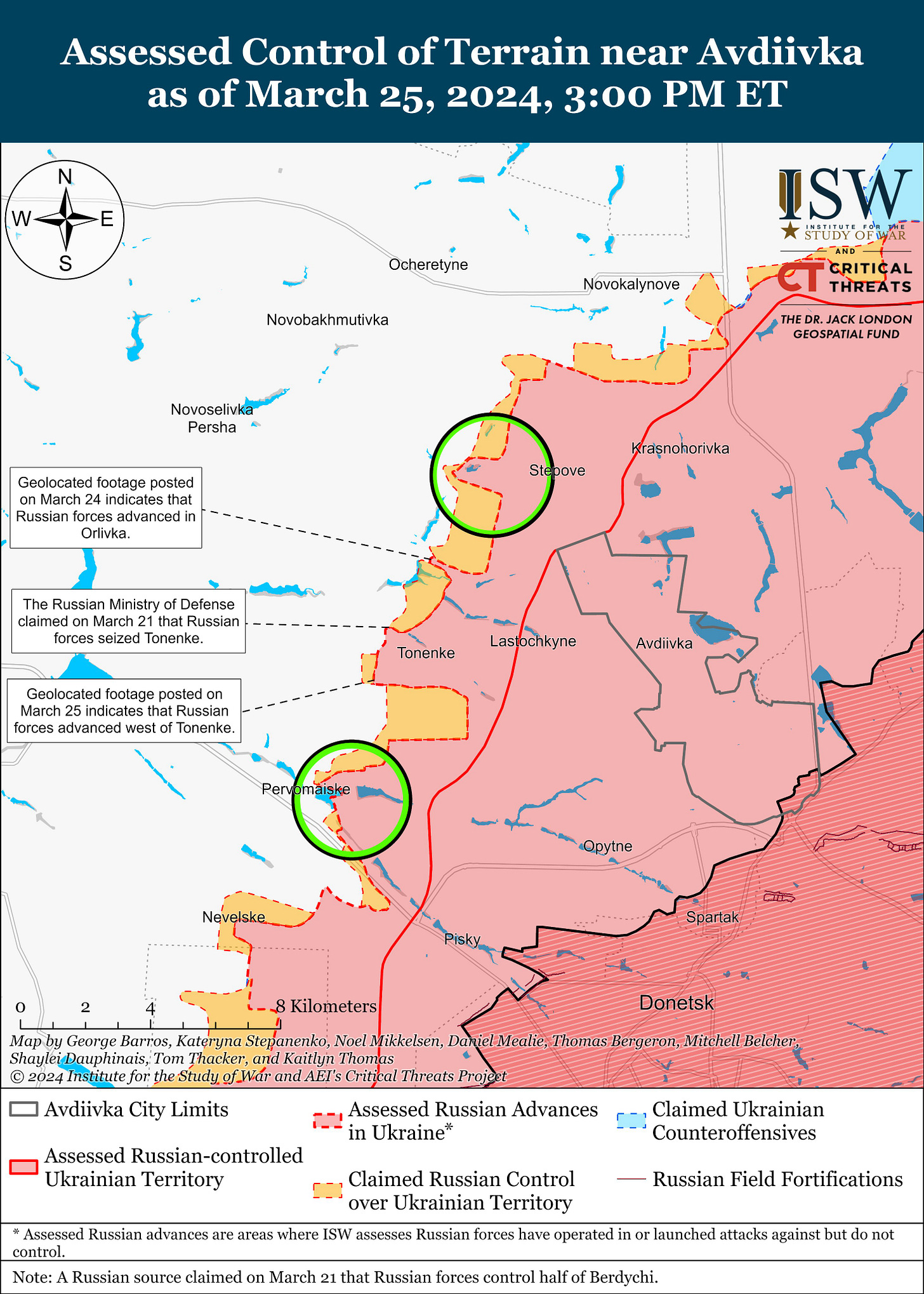
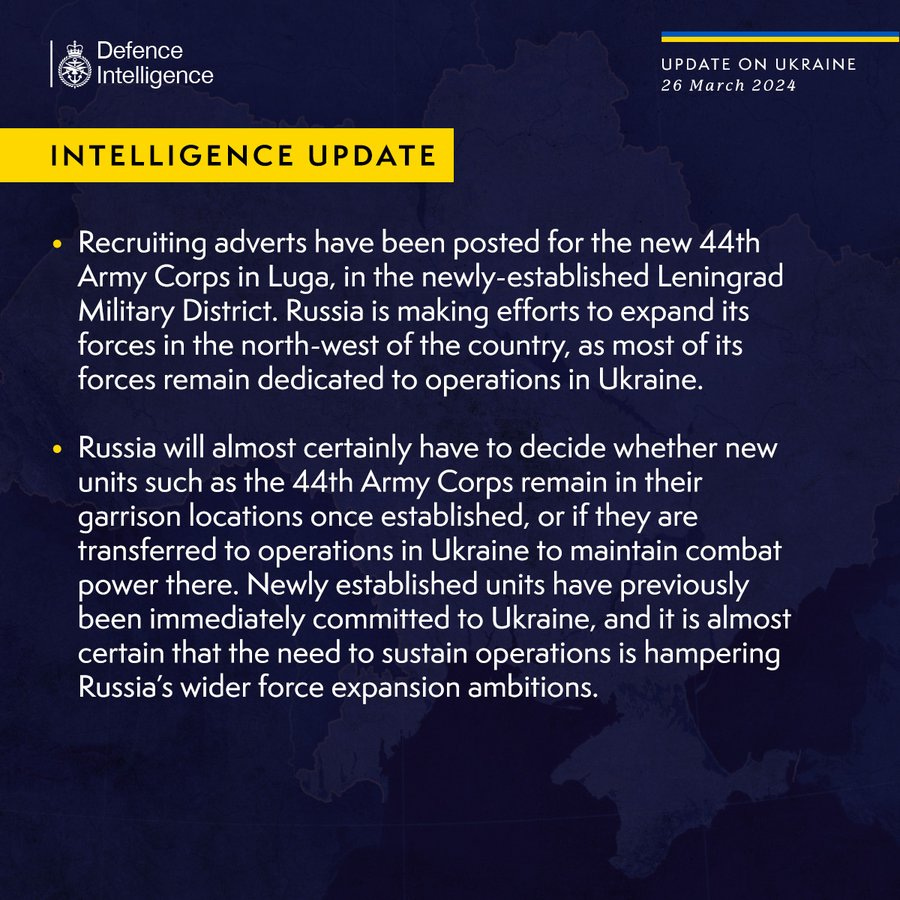
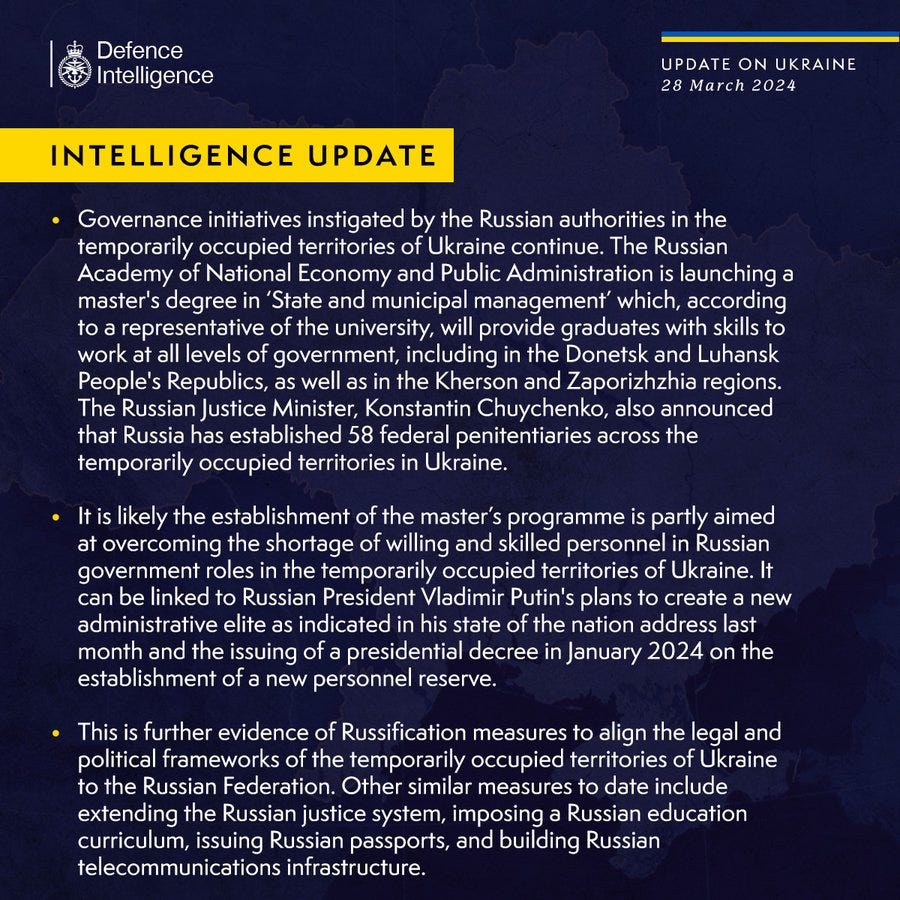


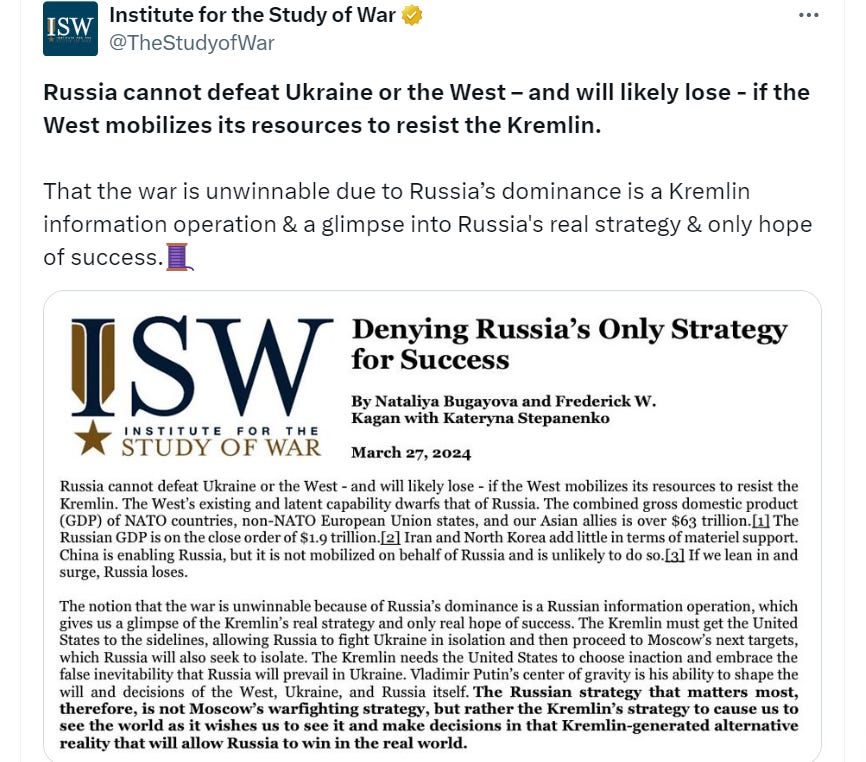


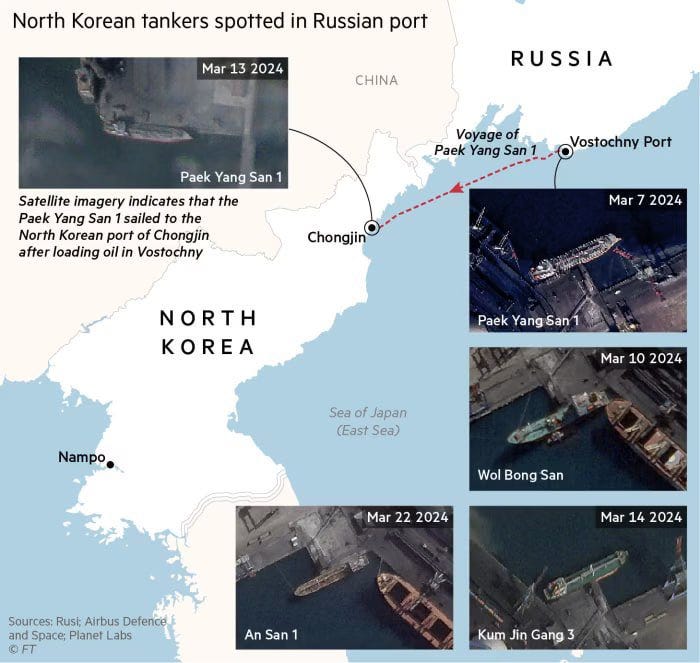






Vladislav Ugolny - he seems like a real treat! *eye roll*
If Putin wants to continue his bromance with Kim Jong Un, he might not want to wear jeans. I heard a great blurb on Monocle Radio's The Globalist this morning that one of the BBC's well known gardening pros had his jeans blurred out when they showed his program on North Korean TV lest they infest the psyche of the poor masses.
I realize my comments aren't about serious topics but sometimes a tiny bit of silliness is needed to balance out the insanity.